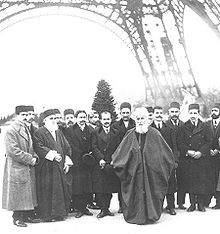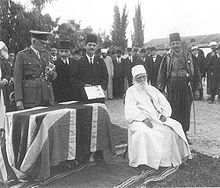Abdul-Baha '
ʿAbdul-Baha ' ( Arabic عبد البهاء, DMG ʿAbd al-Bahāʾ 'Servant of the Glory [of God]', Baha'i transcription 'Abdu'l-Bahá , * May 23, 1844 in Tehran , Iran ; † November 28, 1921 in Haifa , League of Nations mandate for Palestine ) is the best-known title of the eldest son of the religious founder Baha'ullah and head of the Baha'i religious community from 1892 to 1921. His real name is ʿAbbas Effendi ( Persian عباس افندی, DMG ʿAbbās Effendī ). To this day, he is considered a role model for the Baha'i.
Life
'Abdul-Baha' was born in Tehran on the night of May 23, 1844. His mother was Baha'ullah's first wife, Asie Chanum. In his childhood he experienced both his father's imprisonment and exile (the final one in 1852) due to religious persecution and his father's retreat to the mountains of Kurdistan (1854-1856). Having a close relationship with his father, he already worked in his youth as his secretary and representative. Over the years, his responsibilities became more and more extensive.
Even if 'Abdul-Baha' never went to school, he was obviously well read and the author of various writings himself. He was proficient in Persian, Arabic and Ottoman spoken and written. Since the late 1860s he was in contact with Islamic, Iranian and Ottoman reformers and represented both the Baha'i religious community and his family vis-à-vis Ottoman officials.
In his father's last place of exile, in Acre , he gained a positive reputation as a pious, albeit heterodox, Muslim religious scholar; although the Baha'i community is an independent and new religious community. The reason for this lies in ʿAbdul-Baha's regular visits to local mosques, his care for the needy and his general endeavor to smooth the relationship with the Muslim majority as much as possible in order to avoid persecution of the Baha'i.
In 1873 he married the widow Munire Chanum (1847–1938, real name: Fatime Nahri). The couple had nine children, four of whom reached adulthood.
ʿAbdul-Baha 'spent a large part of his life with his father and his family in captivity and exile, including in the Akka prison . It was not until he was 64 years old that he was said to have achieved freedom in 1908 as a result of the Young Turkish Revolution .
His father had used him in his Kitab-i-Ahd (Arabic: " Book of the Covenant ") to explain his writings and to lead the community of his followers. In 1910, ʿAbdul-Baha 'began a major educational tour that took him through Egypt , Europe, and the United States to spread his father's teachings. 'Abdul-Baha' stayed in Stuttgart , Esslingen am Neckar and Bad Mergentheim from April 1 to 8, 1913 , and after returning from Vienna (April 19 to 24) and Budapest he was again in Stuttgart (April 25 until May 1st). In Vienna he received Bertha von Suttner, who later won the Nobel Peace Prize, among others . His followers describe him as a champion of peace, religious tolerance, social justice, women's rights and overcoming racial discrimination. Many of his speeches have been recorded and published in book form.
At the end of 1913 he returned to Haifa . 'Abdul-Baha' was made Knight of the British Empire in 1920 in recognition of his humanitarian services during the war years .
During the First World War, ʿAbdul-Baha 'addressed a number of missions to the Baha'i in North America , giving them a special role in the spread of the Baha'i Faith. These letters were given the title Letter on the Divine Plan .
In his will he named his eldest grandson Shoghi Effendi as his successor as the "guardian" of the Baha'i community.
The day of ʿAbdul-Baha's death, November 28, is considered a day of remembrance in the Baha'i calendar . The burial of ʿAbdul-Baha in the shrine of Bab on Mount Karmel became the most populous demonstration of common concern and grief of all religious and ethnic groups of Palestine to date .
Works
German
- Sara Louisa Blomfield (Ed.): 'Abdu'l-Bahá. Speeches and memos . Baháʼí-Verlag, Hofheim 2011, ISBN 978-3-87037-483-9 ( table of contents ).
- Speeches in England and North America. 1911 - 1912. A selection . Baháʼí-Verlag, Hofheim 2010, ISBN 978-3-87037-485-3 ( table of contents ).
- The secret of divine culture . Baháʼí-Verlag, Hofheim 2008, ISBN 978-3-87037-060-2 ( table of contents ).
- Questions answered . Baháʼí-Verlag, Hofheim 2006, ISBN 3-87037-094-7 .
- "When a thought of war comes, resist it with a stronger thought of peace." The speeches and writings of ʼ Abdu ʼ l-Bahá for a new culture of peace as well as a statement on the International Year of Peace . Baháʼí-Verlag, Hofheim 1999, ISBN 3-87037-365-2 .
- Letter to Forel . Baháʼí-Verlag, Hofheim 1998, ISBN 3-87037-072-6 .
- On paths of love for God . About the Báb and his time . Baháʼí-Verlag, Hofheim 1997, ISBN 3-87037-328-8 .
- “To be a Christian means…” Baháʼí-Verlag, Hofheim 1997, ISBN 3-87037-331-8 .
- Letters and messages . Baháʼí-Verlag, Hofheim 1992, ISBN 3-87037-280-X .
- Will and testament . In: Alliance documents . Bahai-Verlag, Hofheim 1989, ISBN 3-87037-231-1 .
- Epistles to the Divine Plan . Baháʼí-Verlag, Hofheim 1989, ISBN 3-87037-232-X .
- The world peace treaty . Baháʼí-Verlag, Hofheim 1988, ISBN 3-87037-211-7 .
- Role models of loyalty . Memories of Early Believers . Baháʼí-Verlag, Hofheim 1987, ISBN 3-87037-195-1 .
- Speeches in Paris . Baháʼí-Verlag, Hofheim 1983, ISBN 3-87037-062-9 .
- A small selection from his writings . Baháʼí-Verlag, Hofheim 1980, ISBN 3-87037-119-6 .
English
- The Promulgation of Universal Peace . US Bahá'í Publishing Trust, 1982 ( online ).
- Foundations of World Unity . US Bahá'í Publishing Trust, 1979 ( online at the Bahá'í International Community ).
- Bahá'í World Faith — Selected Writings of Bahá'u'lláh and 'Abdu'l-Bahá . US Bahá'í Publishing Trust, 1976, chapters 6-9 ( online at the Bahá'í International Community ).
- Tablets of Abdul-Baha Abbas . Bahá'í Publishing Committee, 1909 ( online ).
literature
- Baha'u'llah: Kitab-i-Ahd (The Book of the Covenant), in: Documents of the Alliance . Baháʼí-Verlag, Hofheim 1989, ISBN 3-87037-231-1 .
- Shoghi Effendi: God is passing . Baháʼí-Verlag, Hofheim-Langenhain 1974, ISBN 3-87037-021-1 .
- Balyuzi, Hasan B .: 'Abdu'l-Bahá. The center of the Baha'u'llah Alliance (Volume 1) . Baháʼí-Verlag, Hofheim 1983, ISBN 3-87037-140-4 .
- Balyuzi, Hasan B .: 'Abdu'l-Bahá. The center of the Baha'u'llah Alliance (Volume 2) . Baháʼí-Verlag, Hofheim 1984, ISBN 3-87037-151-X .
- Gollmer, Werner: My heart is with you: 'Abdu'l-Bahá in Germany . Baháʼí-Verlag, Hofheim-Langenhain 1988, ISBN 3-87037-215-X .
Web links
- Literature by and about 'Abdul-Baha' in the catalog of the German National Library
- Texts for 'Abdu'l-Bahá bahai.org (English)
- 'Abdu'l-Bahá bahai.de
| personal data | |
|---|---|
| SURNAME | Abdul-Baha ' |
| ALTERNATIVE NAMES | ʿAbd al-Bahāʾ; 'Abdu'l-Bahá; Abbas Effendi; Abdulbaha; ʿAbdul-Baha 'ʿAbbas |
| BRIEF DESCRIPTION | Person of the Baha'i religion, son of the founder of the religion Baha'ullah |
| DATE OF BIRTH | May 23, 1844 |
| PLACE OF BIRTH | Tehran , Iran |
| DATE OF DEATH | November 28, 1921 |
| Place of death | Haifa , League of Nations Mandate for Palestine |




